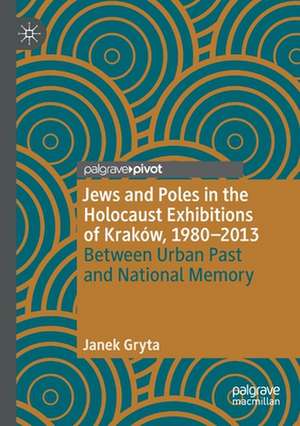Jews and Poles in the Holocaust Exhibitions of Kraków, 1980–2013: Between Urban Past and National Memory
Autor Janek Grytaen Limba Engleză Paperback – 28 feb 2021
| Toate formatele și edițiile | Preț | Express |
|---|---|---|
| Paperback (1) | 412.30 lei 6-8 săpt. | |
| Springer International Publishing – 28 feb 2021 | 412.30 lei 6-8 săpt. | |
| Hardback (1) | 418.45 lei 6-8 săpt. | |
| Springer International Publishing – 28 feb 2020 | 418.45 lei 6-8 săpt. |
Preț: 412.30 lei
Nou
Puncte Express: 618
Preț estimativ în valută:
78.89€ • 82.67$ • 65.22£
78.89€ • 82.67$ • 65.22£
Carte tipărită la comandă
Livrare economică 11-25 aprilie
Preluare comenzi: 021 569.72.76
Specificații
ISBN-13: 9783030389819
ISBN-10: 3030389812
Pagini: 148
Ilustrații: XIII, 148 p. 5 illus.
Dimensiuni: 148 x 210 mm
Greutate: 0.2 kg
Ediția:1st ed. 2020
Editura: Springer International Publishing
Colecția Palgrave Pivot
Locul publicării:Cham, Switzerland
ISBN-10: 3030389812
Pagini: 148
Ilustrații: XIII, 148 p. 5 illus.
Dimensiuni: 148 x 210 mm
Greutate: 0.2 kg
Ediția:1st ed. 2020
Editura: Springer International Publishing
Colecția Palgrave Pivot
Locul publicării:Cham, Switzerland
Cuprins
1. Introduction.- 2. The Shaping of the Holocaust Memory Before the Fall of Communism. The 1980s.- 3. Freezing and Restoring the Memory of the Holocaust. From 1989 to 2004.- 4. Feeling (for) Kraków’s Traumatic Past. The 2010s.- 5. Conclusion.
Notă biografică
Janek Gryta is a Lecturer at the University of Bristol, UK.
Textul de pe ultima copertă
This book offers a unique approach to memory studies by focusing on local memory work conducted across the divide of the fall of Communism, whereas other histories have consistently used 1989 as a watershed moment. By examining the ways in which the Holocaust has been exhibited in Kraków, it investigates the impact local memory work has had on Polish collective memory and problematizes the importance of the fall of Communism for memory work. Using the Polish case study, it contributes to international debates on the nature of urban memory. It brings to the fore the role of mid-ranking governmental and municipal activists for local remembrance, investigates the relationship between the form and the content of the exhibitions, and highlights the importance of authenticity and emotional evocations for Holocaust remembrance. In particular, it focuses on the emergence of cosmopolitan memory of the Holocaust, a process with local, Kraków, sources.
Caracteristici
Offers a unique approach to memory studies by focusing on local memory work conducted across the divide of the fall of Communism Examines the ways in which the Holocaust has been exhibited in Kraków Investigates the impact local memory work has had on Polish collective memory and problematizes the importance of the fall of Communism for memory work
